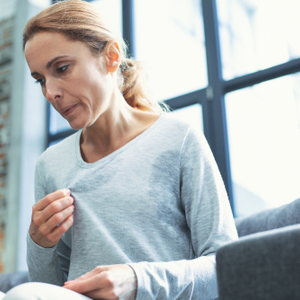
What are menopausal symptoms?
Climacteric complaints are also colloquially called menopause. During this phase of a woman's life, her fertility slowly decreases and finally ends completely. The menopause (climacteric) begins at different times from woman to woman. While some women enter the menopause from the age of 40, for others it does not begin until their early to mid-50s. The menopause is associated with physical changes due to the shift in hormone balance. For some women, this can also lead to psychological problems. However, there are also women who experience the menopause with almost no symptoms.
What phases can the menopause be divided into?
Doctors divide menopausal symptoms into the following three phases:
- Premenopause: The premenopause is the first phase of the menopause and describes the period of the last 5 to 10 years before the last menstruation. During the premenopause, the ovaries slowly stop producing hormones. This can lead to irregular bleeding.
- Perimenopause: The perimenopause begins about one to two years before the last menstrual period. The perimenopause also marks the end of a woman's fertility phase and can be accompanied by hot flushes.
- Postmenopausal phase: The postmenopausal phase ends around the age of 65 and the climacteric symptoms disappear with it.
What are the symptoms of menopausal symptoms?
Climacteric symptoms can manifest themselves as menstrual irregularities, but also as hot flushes and/or sweating. Often the latter occur mainly during the night and can shorten deep sleep time, throwing the sleep-wake rhythm out of balance. The typical hot flushes that occur during the menopause can recur over a period of about 5.2 years. Doctors explain the occurrence of hot flushes by the fluctuations in oestrogen production, which can also be reflected in a slightly depressed mood and/or irritability.
Women who suffer from hot flushes describe a rising heat that spreads over the face, neck and upper body in a very short time. Often, the hot flush is followed by a break in sweat and then a slight chill. The whole phenomenon can last from half a minute to several minutes and can occur up to a few times a week.
However, the lack of oestrogen also means that the mucous membranes of the vagina, urethra and bladder do not build up as much. As a result, vaginal dryness can occur, which in turn causes increased infections (so-called vaginitis). These infections occur because of the lack of protective lactic acid bacteria. This makes the vagina more susceptible to bacterial infections. The dryness of the vagina becomes more noticeable during sexual intercourse and can lead to pain. Itching and/or burning may also occur.
How can climacteric symptoms be relieved?
Herbal medicines, such as Cimicifuga, have proven effective against menopausal symptoms. These can also replace chemical hormone preparations such as hormone-containing vaginal creams or vaginal tablets, which are supposed to compensate for the hormone deficiency in the genital area. In addition to better blood circulation and a stronger build-up of the mucous membrane, it should also become moister and more stable.
Menopausal women who prefer a non-hormonal treatment option can do the following to relieve their menopausal symptoms:
- Lifestyle changes: eating a healthy, balanced diet and getting enough exercise through regular exercise can be beneficial, as can reducing coffee, nicotine, alcohol and hot spices.
- herbal food supplements: The flowers of monk's pepper (Latin: Vitex agnus castus) can help with menopausal symptoms before menstruation (premenstrual syndrome). Black cohosh extracts (Latin: Cimicifuga racemosa) and vitamin E, on the other hand, are often used to treat hot flushes. There are also plants like soy, rhubarb root and red clover as well as wheat germ, which are rich in plant oestrogens (phyto-oestrogens). Sage, on the other hand, is effective in reducing sweating and lavender is extremely calming.
- To strengthen the body and mind, yoga, qigong as well as autogenic training and relaxation techniques are recommended.
Traditional methods for alleviating menopausal symptoms include certain forms of acupuncture, which can relieve menopausal symptoms. But procedures from traditional Chinese medicine (TCM) also help to strengthen body and mind. Special cupping techniques, dietary treatments, herbal remedies, relaxing massages and exercise can all be used.
Do I need to see a doctor if I have menopausal symptoms?
Women who suffer from irregularities in their menstrual cycle or (recurrent) bleeding should consult a doctor. The same applies if the patient cannot cope with the accompanying symptoms of the menopause or in the case of unexplained complaints. In these cases, the gynaecologist treating the patient will try to alleviate the symptoms with the appropriate medication or the appropriate therapy option.
